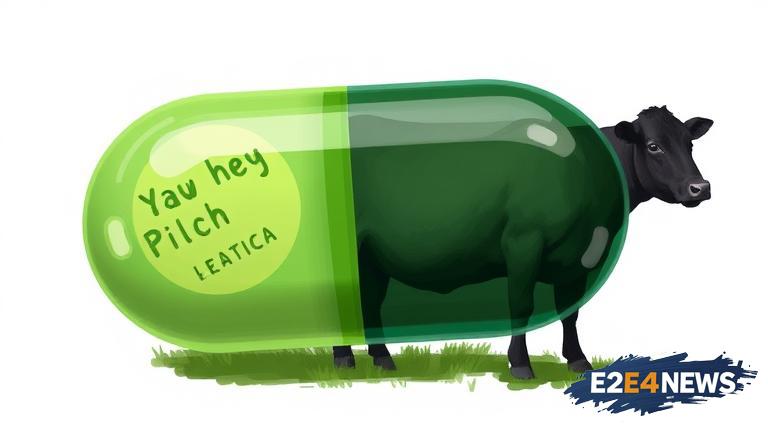New Zealand’s beef sector is poised to become a pioneer in the adoption of a groundbreaking new pill designed to reduce emissions from livestock. The pill, which has been developed by a team of scientists, has shown promising results in reducing the amount of methane produced by cattle, a potent greenhouse gas that contributes to climate change. With the country’s agricultural sector being a significant contributor to its greenhouse gas emissions, the introduction of this pill is seen as a crucial step towards reducing the industry’s environmental impact. The New Zealand government has set ambitious targets to reduce the country’s emissions, and the beef sector is likely to be one of the first industries to be impacted by these changes. The pill works by targeting the microbes in the rumen of cattle, which are responsible for producing methane as a byproduct of digestion. By reducing the amount of methane produced, the pill has the potential to significantly decrease the carbon footprint of the beef sector. The development of this pill is a result of years of research and collaboration between scientists, farmers, and industry stakeholders. The New Zealand beef sector is well-placed to adopt this technology, given its strong focus on sustainability and environmental stewardship. The country’s farmers have already made significant strides in reducing their environmental impact, and the introduction of this pill is seen as a natural next step. The pill is also expected to have economic benefits for farmers, as it will allow them to reduce their emissions without having to make significant changes to their farming practices. This is likely to be a major selling point for the technology, as farmers are often reluctant to adopt new practices that may impact their bottom line. The New Zealand government has also announced plans to provide financial support to farmers who adopt the pill, which is expected to help drive uptake. The introduction of the pill is also expected to have broader implications for the agricultural sector as a whole. As the first industry to adopt this technology, the beef sector is likely to set a precedent for other sectors, such as the dairy industry. The development of this pill is also a testament to the power of innovation and collaboration in addressing the challenges posed by climate change. By working together, scientists, farmers, and industry stakeholders have been able to develop a solution that has the potential to make a significant impact. The pill is also expected to have international implications, as other countries look to New Zealand as a leader in sustainable agriculture. The country’s reputation for innovation and environmental stewardship is likely to be further enhanced by the adoption of this technology. In conclusion, the introduction of the emissions-reducing livestock pill is a significant development for the New Zealand beef sector, and is likely to have far-reaching implications for the agricultural industry as a whole. The pill has the potential to reduce the sector’s environmental impact, while also providing economic benefits for farmers. As the first industry to adopt this technology, the beef sector is likely to set a precedent for other sectors, and is expected to play a key role in driving the adoption of sustainable practices across the agricultural industry. The development of this pill is a testament to the power of innovation and collaboration, and is likely to have a lasting impact on the way that agriculture is practiced in New Zealand and around the world. The pill is expected to be available to farmers in the near future, and is likely to be widely adopted across the industry. The New Zealand government is also expected to continue to provide support for the development and adoption of sustainable technologies, as part of its efforts to reduce the country’s emissions and promote environmental stewardship. Overall, the introduction of the emissions-reducing livestock pill is a major step forward for the New Zealand beef sector, and is likely to have significant implications for the agricultural industry as a whole.
